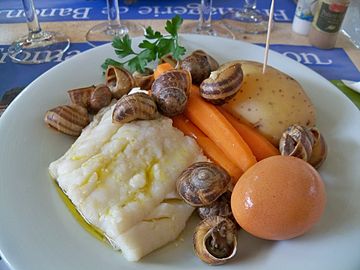Aïoli garni
 | |
| Alternative names |
|
|---|---|
| Course | main dish |
| Region or state | Provence |
| Main ingredients | |
| Ingredients generally used |
|
| Variations |
|
Aïoli garni or grand aïoli is a traditional Provençal dish or meal based on aïoli, usually accompanied by salt cod and boiled vegetables; other ingredients may include escargots, hard-boiled eggs and small boiled octopus. It may also be known simply as aïoli, like the sauce for which it is named.
History[edit]
The aïoli garni is a traditional dish of Provence in southern France. It was described in 1897 by Jean-Baptiste Reboul in La Cuisinière Provençale. He gives as ingredients to accompany aïoli sauce: boiled salt cod, escargots boiled in salted water with fennel and onions studded with cloves, boiled artichokes, boiled carrots, potatoes with their skins on, and hard-boiled eggs. He also says that small boiled octopus are often included, that the presentation is an important aspect of the dish, and that the ingredients used may be changed at will.[1]: 35 [2]: 6 Other ingredients may include beetroot, raw or cooked sweet peppers, boiled white fish, chick-pea salad,[3]: 354 florets of cauliflower, boiled navets (young turnips) and fresh tomatoes.[4]: 443
If meat such as boiled chicken, or boiled beef taken from the pot-au-feu, is included, the dish becomes a grand aïoli.[3]: 354 This is traditionally served on Christmas Eve[5]: 7 and on Fridays.[3]: 354
References[edit]
- ^ Jean-Baptiste Reboul (1900). La Cuisinière Provençale (third edition, in French). Marseille: Librairie P. Ruat.
- ^ Prosper Montagné (1977). New Larousse Gastronomique. London; New York; Sydney; Toronto: Hamlyn. ISBN 060036545X.
- ^ a b c Elizabeth David (1964 [1960]). French Provincial Cooking. Harmondsworth, Middlesex: Penguin Books.
- ^ Elisabeth Luard (1986). European Peasant Cookery. London: Corgi. ISBN 0552128708.
- ^ Alan Davidson(1999). The Oxford Companion to Food. Oxford: Oxford University Press. ISBN 9780192115799.



